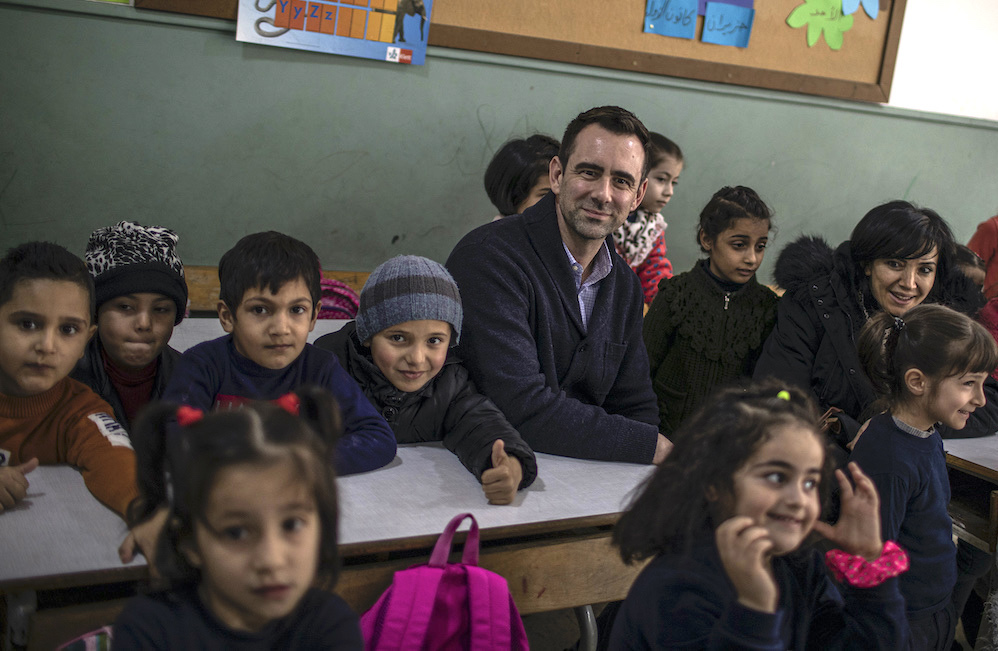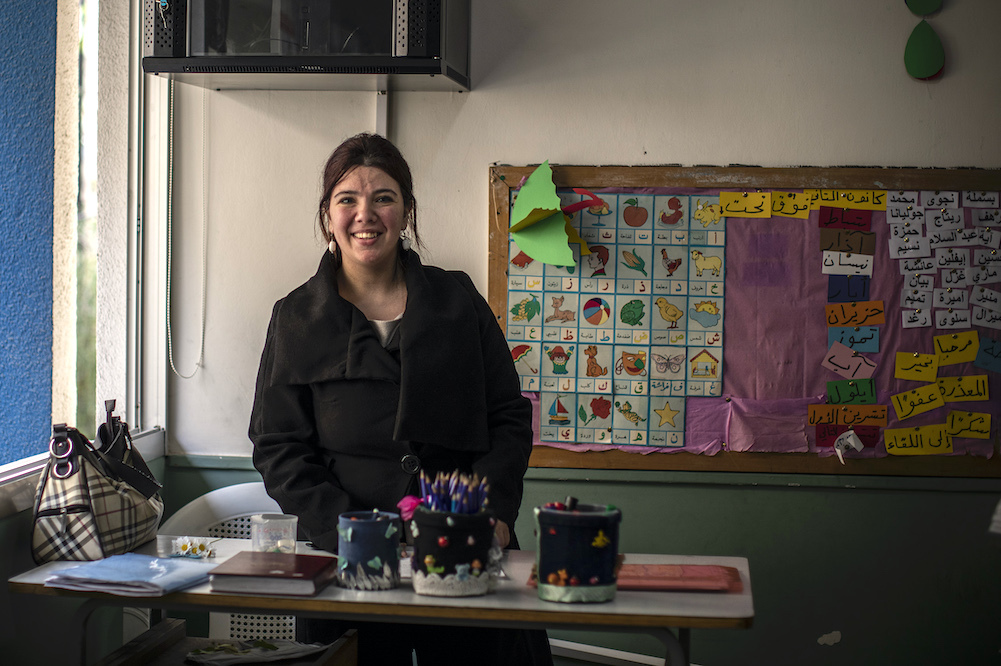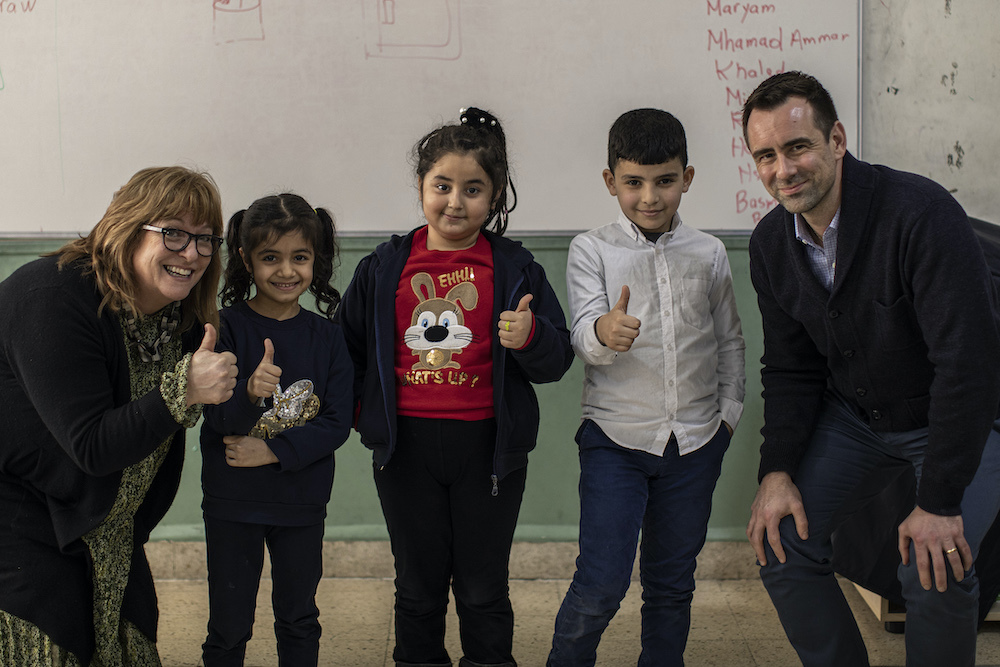‘The teachers are responding, the children are happier’ – the early verdict on our early years inclusion project

A Theirworld pilot project to bring more inclusive education to Syrian refugee children in Lebanon is showing encouraging early signs.
On first impressions, the first-floor classroom at Bourj Hammoud School in Beirut looks like many others.
Colourful posters and learning aids are spread around the walls to help the class of five- and six-year olds learn the alphabet and basic words – not just in their native Arabic but in English too.
When their teacher Maya Assaker poses a question, some thrust their hands in the air in eagerness to respond. There’s a high five from Maya for Hassan Kheir when he pronounces that H is for “happy hen”. Others, not confident of answering, twist in their chairs or look down.
But something exceptional is happening at Bourj Hammoud and four other schools in Lebanon. These schools are piloting an innovative approach to inclusive early childhood education for refugees, nearly all of whom have fled the war in Syria or were born to parents who escaped the violence nearly 10 years ago.
The project aims to help teachers like Maya identify and support children with potential special educational needs. Given their experiences as refugees, the children’s difficulties may include anxiety and trauma, as well as more commonly perceived special needs such as dyslexia, autism or mental disability. The Ministry of Education has furthermore hired counsellors to help children struggling with such problems.
Until now, there have been limited mechanisms for assessing tens of thousands of early years Syrian refugee children in Lebanon for special needs. In all, every year 150,000 Syria children attend the country’s public schools.
The project was launched by Theirworld after local organisations and experts raised concerns that large numbers of distressed, disturbed or disabled children in early years education could be going undetected, with no extra provision being made.

Teacher Maya Assaker at Bourj Hammoud School in Beirut (Theirworld / Diego Ibarra Sanchez )
The project places special educators and psycho-motor therapists in the five schools twice a week to work alongside nearly 50 kindergarten teachers and teaching assistants who are preparing children for Grade 1, the first year of primary school.
Teachers start by attending two workshops on the importance of inclusive education, how to assess potential special educational needs and how to implement inclusive teaching methods and lesson plans.
At Bourj Hammoud, even though the project is only four months old, the early signs are very encouraging, says Maya, who has been teaching for nine years.
“The workshops gave us the strategies for more understanding of how to help the children with their learning. The workshops have really helped me. I get such positive energy from the specialists and I feel happy whenever I see them!”
Randa Saikaly, head teacher of the school, is similarly enthusiastic. She says: “There are so many children who have trauma or emotional disturbance or may be afraid of the dark, for instance.
“The two specialists are helping those children to overcome the challenges they have. Already we are seeing the benefits. The children are happy because they can see the change in their performance and in the way the teachers interact with them.”
It is early days but we are seeing a lot of progress. We see that children are open to learning. Hiba al Jamal, director of SKILD
Next month workshops are due to start for parents to assist them in understanding their children’s challenges and to enable them to provide academic, emotional and social support.
Every child in the pilot classes has now been screened for potential special educational needs. The data will be collated and analysed. However, the early indications are that there is a considerable demand for special educational teaching among Syrian refugee children.
The project is being conducted in partnership with SKILD (Smart Kids with Individual Learning Differences), a Lebanese charity devoted to dedicated to providing specialist support for children with special needs and learning difficulties, and with a research team led by Dr Bassel Akar, director of the CARE Centre at Notre Dame University – Louaize.
Hiba al Jamal, director of SKILD, says: “It is early days but we are seeing a lot of progress. We see that children are open to learning. Teachers may be a little defensive at first, but when they realise that the aim of the workshops is to support them, they become very cooperative.”
After the pilot phase, Theirworld is looking to expand the initiative beyond the five schools after the 2019-20 academic year in order to reach more children across the country.

Emma Sergeant – a member of Theirworld’s advisory bard and president of the DAS Group of Companies at Omnicom – with Justin van Fleet and students from Bourj Hammoud School in Beirut (Theirworld / Diego Ibarra Sanchez )
That is a model the charity has followed before in Lebanon – identifying a problem and then collaborating with government, international agencies and NGOs to develop a solution and coordinate an effective, large-scale and sustainable response.
By 2013, more than 500,000 school-aged displaced Syrian children were living in Lebanon and very few were in school.
Theirworld funded a team of experts who proposed a “double-shift school” system which would allow Syrian refugees to use classrooms in the early afternoon after Lebanese children had gone home at their normal time.
The second shift system has so far educated more than 300,000 Syrian refugee children, with Theirworld continuing to support the Lebanese Ministry of Education’s RACE (Reaching All Children with Education) Programme Management Unit which manages the programme.
The unit is led by Sonia Khoury, who visited Bourj Hammoud School this week with Theirworld President Justin van Fleet, advisory board member Emma Sergeant and Lisa Belzberg, a board member at the Global Business Coalition for Education, which Theirworld established.
Justin says: “It has been great for all of us to see this inclusion project in action and to see such encouraging initial signs that it will have a beneficial impact. This project really defines what we’re all about at Theirworld – unlocking big change.”